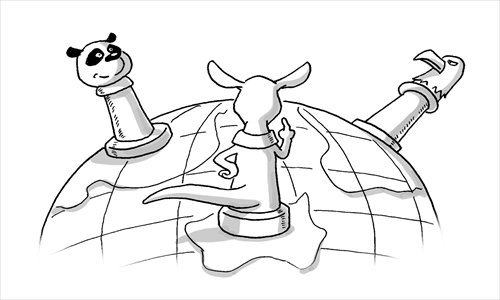Turnbull promotes clear-eyed view of China

Illustration: Liu Rui/GT
Australia now has a new Prime Minister, Malcolm Turnbull, who is likely to take a very different approach to foreign policy from his predecessor, Tony Abbott.
Abbott knew little about international affairs, and he did little while he was prime minister to address the big challenges that Australia faces in defining its place in Asia in the Asian Century.
Turnbull, by contrast, has thought very deeply about the world, and especially about Asia and Australia's place in it. He has set out his ideas about these questions in great detail, explaining that Australia's strategic and economic environment in Asia is changing fundamentally, and that Australia's foreign policy is going to have to change fundamentally too.
Above all, Turnbull has argued that Australia has to rethink its relations with both China and the US. These are sensitive issues for Australians, and it would require great political skill and courage for Turnbull to persuade them to accept his ideas about the need for a new approach. But there is a real chance he might succeed, and if he does, then Australian policy - especially toward China - might well start to change.
The first difference between Turnbull and most other Australian politicians is that he knows China very well. He was a successful businessman before entering politics, and he learned about China through his involvement in a number of enterprises there as well as through intensive study and research. He understands the depth of China's economic achievement, and can see behind the short-term trends the underlying reality - that China will become and remain the world's largest economy on any measure.
Second, Turnbull understands that China's rise constitutes a fundamental shift in Asia's strategic order - what he has described as "the great geopolitical transformation of our time" - and that Western nations will need to respond to "a very different distribution of global power." He doubts they have yet worked out how to do this.
In particular, though he has praised US President Barack Obama's pivot policy as a stabilizing factor in the region, he has also cast doubt on how effectively the US has responded to China's rise. At one point, he said that Washington seemed "utterly flummoxed" about how to deal with challenge of a rising China.
At the same time, he has been quite critical of China too. Earlier this year, for example, he said, referring to territorial issues in the South China Sea, that "there seems little doubt that the tough line taken [by China] on the disputed islands and reefs has been quite counter-productive."
Turnbull clearly believes that the shift in power to Asia, and especially to China, will require Australia to rethink its foreign policies fundamentally. He has told Australians that they cannot assume that "... the strategic and diplomatic posture that served us in the past can and will serve us unchanged in the future; or that it doesn't matter if our strategic and economic messages to our region are somewhat contradictory."
Perhaps the most important message he has delivered in his statements about foreign policy so far has been that Australia cannot simply align itself with US policy in relation to China, but must fashion its own approach.
Back in 2011, he said that "an Australian government needs to be careful not to allow a doe-eyed fascination with the leader of the free world to distract from the reality that our national interest requires us to truly (and not just rhetorically) to maintain both an ally in Washington and a good friend in Beijing."
Nor does he believe that Australia can manage its relations with Washington and Beijing simply by trying insincerely to align itself with both sides at the same time. He has cautioned against "extravagant professions of loyalty and devotion to the US" and also against "equally extravagant compliments paid to Beijing."
How then will Turnbull steer Australia's foreign policy? There is no doubt he believes the US should continue to play a strong and effective role in Asia as a key element of the regional strategic order. But equally it is clear he believes that the regional order must adapt to the new distribution of wealth and power by according China a bigger leadership role than it has had in the past.
That suggests he sees Australia's interests being best served by a new Asian geopolitical construct in which both the US and China, as well as the region's other major powers, all play major roles. This would be of course a very different regional order from the one that has been sustained under sole US leadership for many years now. It would also be very different from a Chinese-led order in Asia that some assume to be the only alternative to US leadership.
Building this kind of new order would require very energetic and deft diplomacy. It is possible that under Turnbull, Australia might play a bigger role in that diplomacy.
The author is professor of Strategic Studies at the Australian National University in Canberra. opinion@globaltimes.com.cn